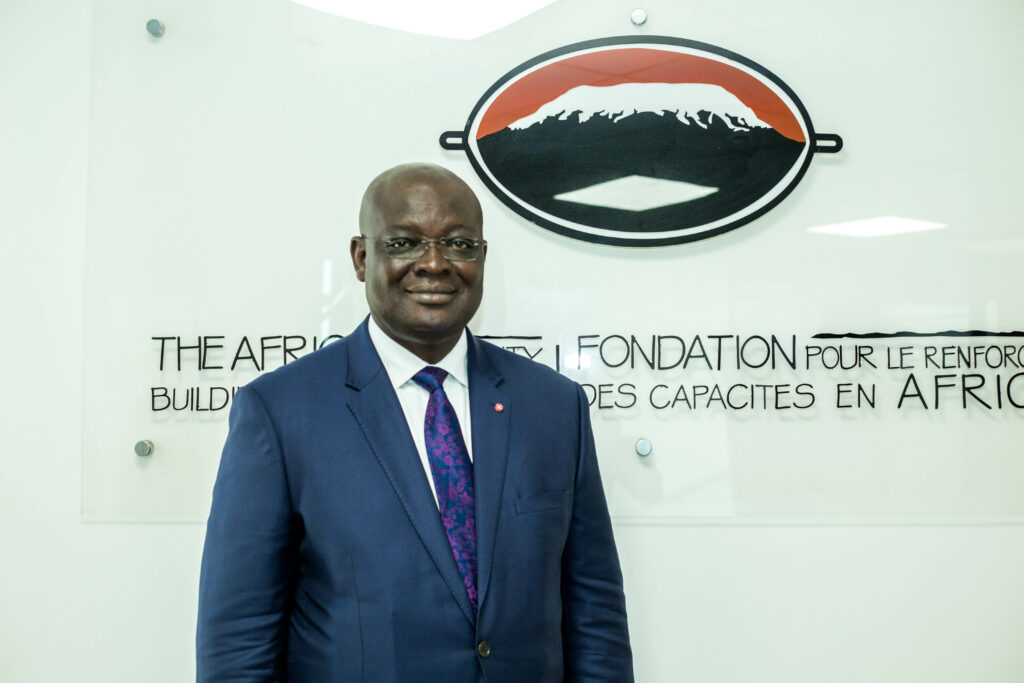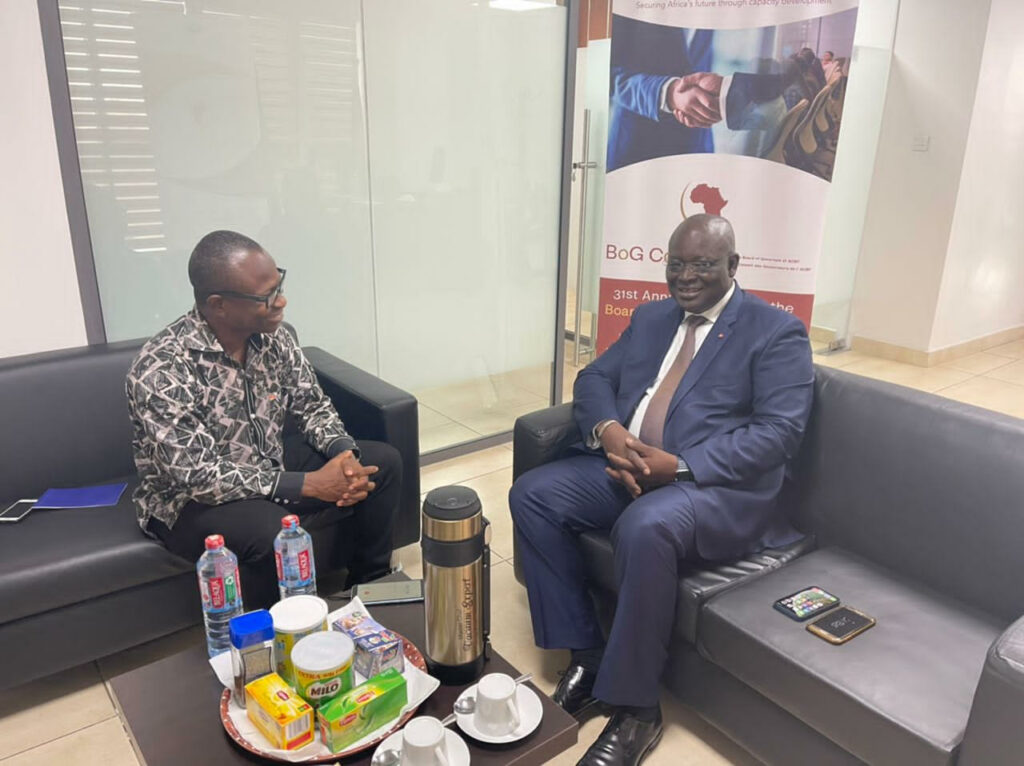The future of ACBF would be driven by priority of member-states – Biteye

The African Capacity Building Foundation (ACBF), a capacity building agency of the African Union has been working to build capacity for African countries, researching, publishing and training citizens and public officials to build their capacities in service delivery and expertise. Going forward, the newly appointed Executive Secretary, Mamadou Biteye says, the activities of the Foundation will be driven by what member countries determine as their priority.
Biteye speaking to Ghana Business News in this second part of an exclusive interview in Accra, Ghana says, “so what we will do in the future will be driven by the priorities of our member-states. The past is extremely important to develop a bright future. We are coming with an open mind.
We have just embarked on a process fashioning or looking at the roadmap – the impact it has had, what has worked, what was less successful and derive all the lessons that we can learn from that,” he told Ghana Business News.
“But what is very important is that I’m coming at a moment when the last five-year strategic plan is coming to an end this year, and we are going to develop our next five-year strategy. That’s my first priority. But the process will be highly consultative and will be based on the priorities of our member-states. Because to me the essence of the existence of ACBF is to add value to member-countries,” he emphasized.
Born and bred in Senegal, Biteye, who studied in both the West and East, the US and Ukraine, describes himself as a global citizen, having worked in Africa, the US, Europe and the Middle East.
“You know between plans and aspirations, and concrete results, there is what we call implementation, execution. Between saying something and actually doing it is a wide gap, and that gap is about ability to execute. So when we look at the different challenges faced by the continent, for instance the youth bulge and unemployment – what I will call the headache or challenge of every government not only in Africa, but around the world, but Africa has the youngest population – the largest labour force, that’s a big challenge, how do we transform that as an opportunity and stop seeing our sons and daughters perish in the Mediterranean?” He asked.
Biteye cited the impact of climate change and how it endangers cities, creates shocks from a public health perspective, and others, and indicated that it’s very important to pay attention to the continent’s needs.
“We can talk about devolution – many of our countries have embarked on the process of devolution, taking services closer to citizens, which is extremely important.
You can talk about transformation of agriculture, reduction of food losses. In Africa on average 30 per cent of everything we produce is lost due to inefficiency. You can go on and on and on. But to address it, would require capacities. Capacities in creating the enabling environment, which is creating capacities in policy-making, legislation and regulation. It’s also technical capacities,” he said.
If public officials don’t have the skills, it affects everyone. The citizens, parliament and the private sector, technical and financial partners and it affects the countries’ development because you don’t have the capacity to deliver the skill and on time.
He then asked: “How do we create more capacities so that we can develop our own education curricula that addresses our development needs? Including bringing new technology that allows more people to access education more easily, less costly, reducing congestion in faculties and in schools?”
Biteye noted that the focus of the organisation will be where the heart of ACBF’s capacity would be. Which is value-added services in capacity building which is multi-form which prioritises country’s needs which all contribute to advancing the African Union’s Agenda 2063.
Sharing experiences from his past, he said; “When I was at the Rockefeller Foundation I led the design of several programmes, and one of them was building the capacity of public sector to deliver on development programmes.
If public officials don’t have the skills, it affects everyone. The citizens, parliament and the private sector, technical and financial partners and it affects the countries’ development because you don’t have the capacity to deliver the skill and on time.
For instance financial and technical partners are unable to disburse large amounts of financing because of lack of absorption capacity,” he said.
“When we talk about absorption capacity, we are talking about execution and implementation capacity,” he added.
He believes that the lack of capacity is a big challenge.
“The capacity to legislate, to address specific challenges is important and that’s what we are aiming at building on. This is why when I was approached by the recruitment agency, I thought, yes. This is something that is very important. It is strategic and it’s important for the continent,” he said.
Bringing more STEM oriented programmes in Africa is going to be crucial, because to attain economic stability, to go through industrialization in an effective way, would mean having scientists, engineers. It also means having patents, intellectual property which would add even more value.
Having lived in the UAE for the past three years, Biteye said he has seen how government delivers services to citizens in that country in a very efficient and effective way, and how it has created the conditions that attract private and foreign direct investment.
“It’s all about capacities. And for me having seen that, I believe if there is a better way to give back to Africa, there is no better way to do that than through capacity building. Additionally, I will say there is no better place than the African Capacity Building Foundation to do that,” he said.
Asked what he would do differently, considering that ACBF has in the past invested in training Africans at the PhD level, among others.

He said, “The past is extremely important to develop a bright future. We are coming with an open mind. We have just embarked on a process fashioning or looking at the roadmap – the impact it has had, what has worked, what was less successful and derive all the lessons that we can learn from that. But what is very important is that I’m coming at a moment when the last five-year strategic plan is coming to an end this year, and we are going to develop our next five-year strategy. That’s my first priority. But the process will be highly consultative and will be based on the priorities of our member-states. Because to me the essence of the existence of ACBF is to add value to member-countries,” he said.
Biteye also emphasized the importance of science, technology, engineering and mathematics (STEM) education in Africa.
“Bringing more STEM oriented programmes in Africa is going to be crucial, because to attain economic stability, to go through industrialization in an effective way, would mean having scientists, engineers. It also means having patents, intellectual property which would add even more value. African countries need the capacity to process own raw materials, agriculture produce and so on, so we can retain more of the value on the continent and create jobs,” he stated.
Africa, he says, needs to close the big gap in the skills sector however – the huge need for middle-level managers, not with university level graduates, but such as polytechnic training.
“There is a paradox, that is to us to be successful in education is to have a Masters or PhD, but we lack the qualified people to fill the gap in the infrastructure sector – that can be taken by people with the requisite skills to deliver.
African countries must reform their education systems to make them fit for purpose,” he emphasized.
The role that ACBF can play in achieving this is to build the institutional capacities to create those conditions, he said.
Biteye who arrived in the country this week, would be taking part in the 53rd Board of Governors Annual Meeting taking place in Ghana, early next week.
By Emmanuel k. Dogbevi
Copyright ©2022 by NewsBridge Africa
All rights reserved. This article or any portion thereof may not be reproduced or used in any manner whatsoever without the express written permission of the publisher except for the use of brief quotations in reviews.
